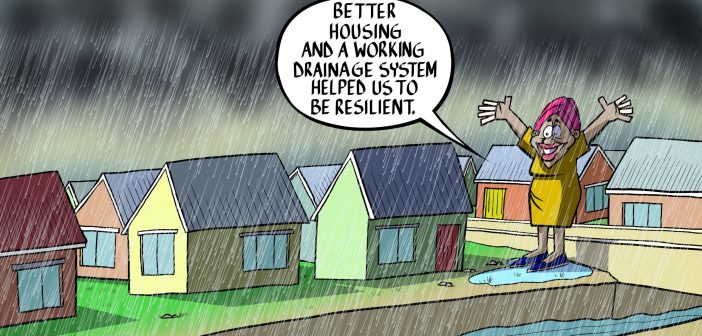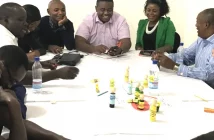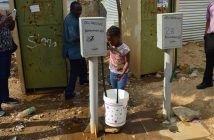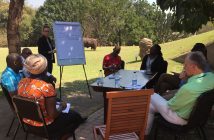Participatory climate information distillation for urban flood resilience in Lusaka
Building on the success of engagements in Lusaka in the first phase of FRACTAL, the FRACTAL-PLUS project aimed to advance the “distillation” approach and explore the use of hydro-climate evidence in co-developing flood resilience narratives and adaptation pathways for Lusaka. The project was funded by the UK’s Natural Environment Research Council (NERC) over six months from October 2021 to March 2022, in support of the COP26 Adaptation and Resilience theme.
FRACTAL-PLUS has done well to zero in on the issue of urban floods and how climate change pressures are making it worse. The people of Lusaka have continually experienced floods in various parts of the city. While the problem is widespread, the most affected people remain to be those in informal settlements such as George and Kanyama where climate change challenges interact with poor infrastructure, poor quality housing and poorly managed solid waste.
Mayor Ms. Chilando Chitangala, 29 March 2022
FRACTAL-PLUS centred on two collaborative Learning Labs held in Lusaka in January and March 2022. Despite challenges presented by Covid-19, all planned activities took place thanks to the flexibility and enthusiasm of the project team and stakeholders in Lusaka.
Building on an initial evidence gathering and dialogue phase at the end of 2021, the first Learning Lab was held on 26-27 January 2022, with 20 in-person attendees, including city stakeholders (e.g. Lusaka Water Security Initiative – LuWSI, Lusaka City Council), the local project team, and one person from the Met Office; the remainder of the project team joined via Zoom. Using interactive exercises, games, presentations and discussions on key challenges, the Lab revealed the complexities in addressing flood risks in the city and helped unite participants to work together.
The Lab informed further evidence needs to support flood resilience actions. Two surveys were developed and completed in February 2022, including 20 in-depth responses from local residents affected by flooding. Changes in flood risk were simulated based on a range of future scenarios from existing regional climate model simulations. Narratives of present-day flood risk were articulated.
With an improving Covid-19 situation, a second Learning Lab was held entirely in-person on 29-30 March 2022. It was preceded by field visits to flood-affected communities and the Zambia Meteorological Department. The Lab was attended by 25 people, most of whom attended the first Lab, and included several members of the local and international project team and an FCDO representative. The Lab was opened by the Mayor of Lusaka (see case study materials). It involved interactive exercises to co-construct future climate-resilient development pathways for Lusaka, taking into account the multiple sources of evidence developed, helping advance dialogue towards creative and long-term solutions.
Key outcomes from the project include:
- Informing city officials, including the mayor who attended the second Learning Lab (see quote), responsible for developing Lusaka’s new integrated development plan (IDP).
- Demonstrating that flooding will be an ongoing issue even if current drainage plans are implemented, with projections of more intense rainfall over the 21st century, pointing to the need for more holistic and long-term solutions.
- A plan to integrate flood modelling outputs into the Lusaka Water Security Initiative (LuWSI) digital flood atlas for Lusaka.
- Informing potential future work in Lusaka and other locations, demonstrating how hydro-climate evidence related to flood risk can be co-developed and interrogated through participatory processes.
The FRACTAL-PLus team also continued to reflect on the FRACTAL principles that were suggested near the end of the first phase of FRACTAL; to offer practical insights based on FRACTAL experiences. This reflection culminated in the development of a working paper entitled Principles for co-producing climate services: practical insights from FRACTAL and a shorter learning brief.




